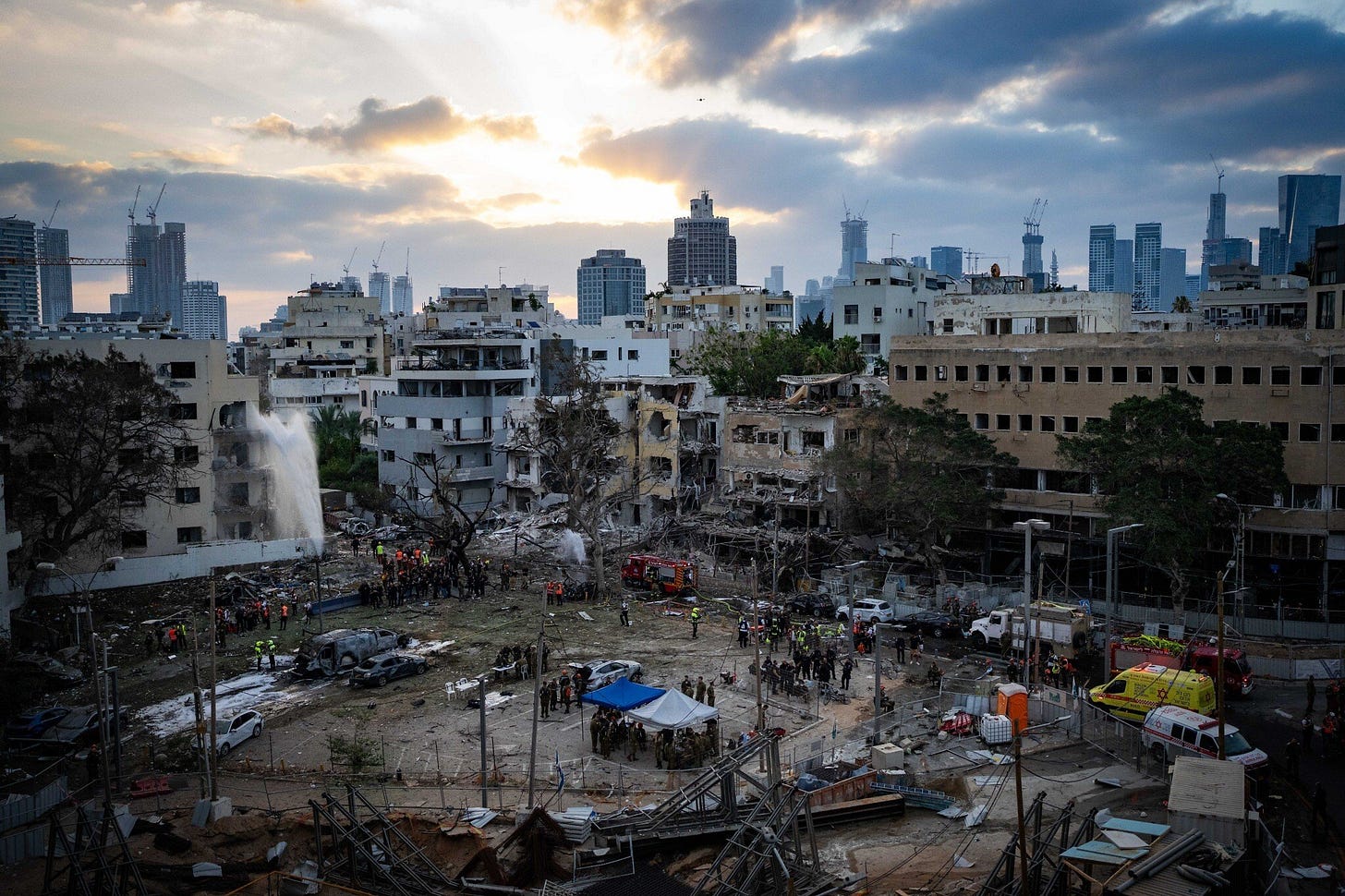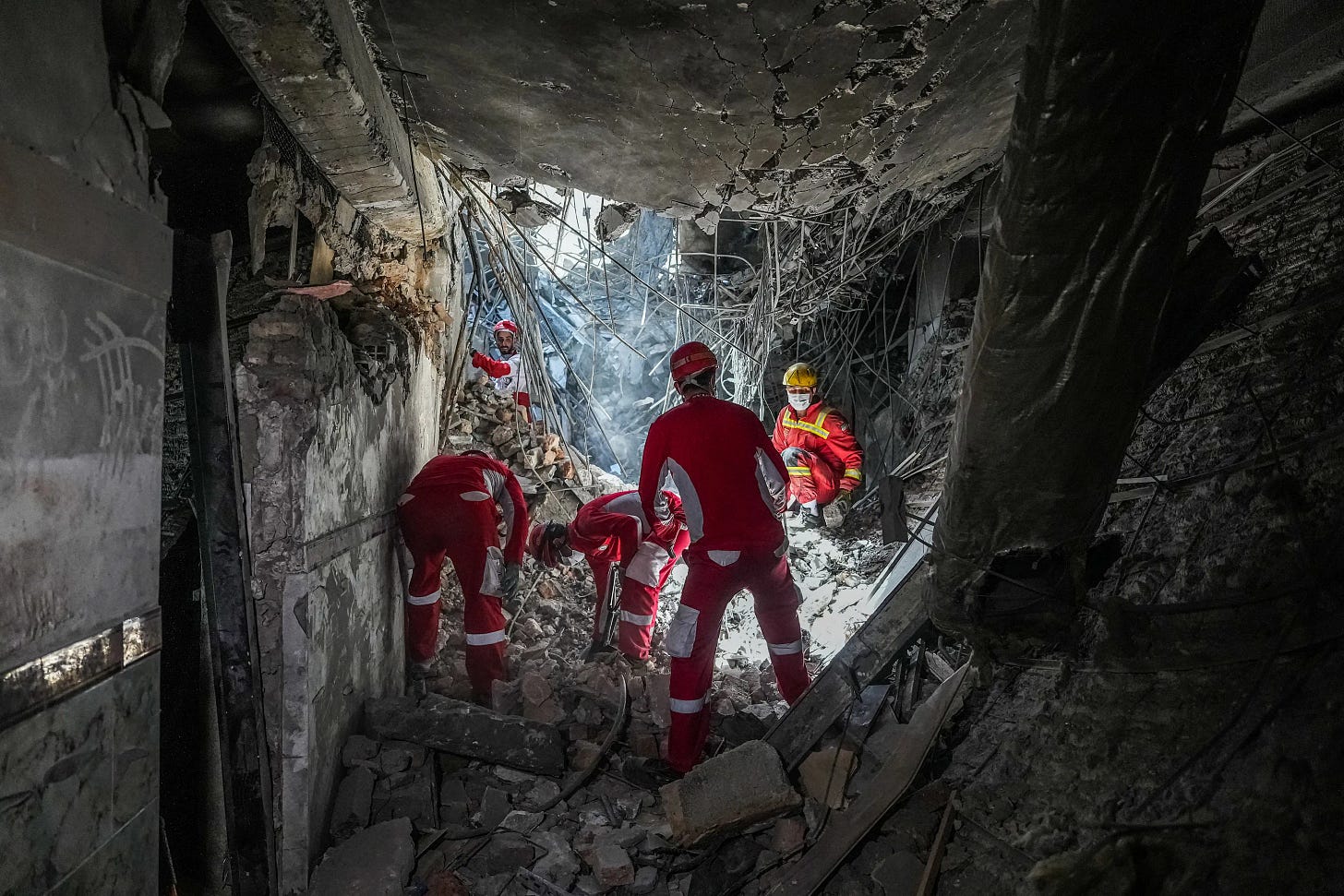How US-Israeli Regime Change In Iran Failed
All my investigations are free to read, thanks to the enormous generosity of my readers. Independent journalism nonetheless requires investment, so if you value this article or any others, please consider sharing, or even becoming a paid subscriber. Your support is always gratefully received, and will never be forgotten. To buy me a coffee or two, please click this link.
On July 29th, the Tel Aviv-based Institute for National Security Studies, a think tank that is enormously influential on Zionist entity ‘defence’ and security policy, published a document advocating for regime change in Iran, setting out potential methods by which Israel could achieve that malign end. In a bitter irony, much of the report’s contents not only attest to the implausibility of achieving such a goal, but lay bare how Benjamin Netanyahu’s calamitous ‘12 Day War’ has made this objective all the more unfeasible.
A flagrant deceit lies at the document’s core. Namely, “Israel did not set the overthrow of the regime in Iran as a goal in the war.” In reality, on June 15th Netanyahu menacingly declared the entity’s unprovoked attack on the Islamic Republic “could certainly” produce regime change. He claimed the government was “very weak”, and “80% of the people would throw these theological thugs out.” Such bold pronouncements were quickly silenced by an unprecedented and devastating missile barrage from Tehran, which Tel Aviv couldn’t repel.
Instead, INSS claims “some” military moves undertaken by the Zionist entity during the 12 Day War “were intended to undermine the foundations” of the Islamic Republic, and ignite mass public protests. However, the Institute admits “not only is there no evidence Israel’s actions advanced this goal, but at least some of them had the opposite effect.” The “clearest example” of this failure, per INSS, was Tel Aviv’s blitzkrieg of Evin prison on June 23rd - a “symbolic blow…intended to encourage public mobilization.”
As it was, scores of civilians, including prisoners and their family members, medical professionals, administrative staff, and lawyers were killed, which “aroused harsh criticism of Israel” even among “critics and opponents” of the Iranian government “inside and outside” the country, the Institute records. Western media and major rights groups condemned the action, with Amnesty International branding it a “serious violation of international humanitarian law” that “must be investigated as a war crime.”
Likewise, attacks on the headquarters of Iran’s internal security forces and IRGC branch Basij “had no noticeable effect and did not lead to eruption of public protests.” INSS suggests Israel’s reckless, indiscriminate targeting of civilian infrastructure during the conflict also neutralised any prospect of citizens taking to streets even if they were at all inclined to do so, due to concerns they may be caught in crossfire. Moreover, Tel Aviv’s belligerence elicited an intense “anti-Israel wave” among the public.
The Institute observes how Iranians “exhibited a notable degree” of “rallying around the flag” during the 12 Day War - “a willingness to defend their homeland at a critical moment against an external enemy.” IINS laments how any and all traces of public dissent in the Islamic Republic “have almost completely disappeared”, in the conflict’s wake. Today, there is no “organized, structured opposition” within or without the country capable of mobilising protesters, let alone displacing the Islamic Republic’s popular government.
Instead, Tel Aviv’s wanton bellicosity has only increased fears among Iranians that foreign powers are seeking to incite and exploit “anarchy and civil war…to impose an alternative political order” on Tehran. It also represented “the most traumatic event for the Iranian public” since the Iran-Iraq war during the 1980s. Millions of citizens, particularly younger generations external actors typically look to as regime change footsoldiers, “have now been exposed to the horrors” of “imposed” conflict - and are resultantly more united than ever against external threats.
‘Inadvertent Effects’
Meanwhile, the Islamic Republic demonstrated a “high level of internal cohesion”, and “ability to recover relatively quickly” from the Zionist entity’s initial onslaught. INSS bemoans how “there is no indication…of a significant and immediate threat to the stability” of Tehran. On top of the government enjoying “considerable support” among Iran’s “security and law enforcement apparatuses,” Mossad-controlled internal networks that initially wreaked havoc upon the 12 Day War’s eruption have been systematically hunted down, and liquidated. It will be difficult if not impossible to reconstruct them.
Despite all this, the Institute inexplicably declares regime change in Tehran remains “a possible solution” and “worthy goal” - not just for the Zionist entity, but “the region, and the West.” The report sets out four “different strategies for overthrowing” Iran’s government, each more fantastical than the last. INSS advocates “beheading the ruling leadership” - assassinating “senior regime officials, including the Supreme Leader, his inner hive, and the heads of the political and military leadership,” arguing it might “create a reality that could develop into political change.”
The Institute alternatively suggests “a covert campaign to promote regime change, led by military, security, and political elements in Iran,” to foment a violent palace coup. Another option is “encouraging, organizing, and supporting opposition organizations in exile and training them for a quick return to Iran and taking over the centers of governmental power.” Finally, “providing aid and support to ethno-linguistic minorities while encouraging separatist tendencies and internal divisions within Iran” is mooted.
However, INSS contrarily concedes every proposed route “could lead to the opposite results of strengthening the government’s cohesion in Tehran and ‘rallying the public around the flag’,” and should thus be avoided. For example, the few Iranian diaspora who applauded the Zionist entity aggression’s against their home country, if not supported all-out insurrection in Tehran - most prominently monarchists - repulsed domestic audiences. “Large segments of the Iranian public” thus perceive them as “having betrayed Iran in its time of need”:
“Although aligning with pro-Western and pro-Israel diaspora groups that push for revolutionary change may seem natural, such associations may, in fact, undermine the credibility of internal opposition and ultimately obstruct the desired outcome.”
Similarly, the Institute warns assassinating Ali Khamenei - “raised as a possibility during the war” - “would not necessarily result in regime change,” and probably backfire spectacularly. The Islamic Republic “would likely have little difficulty selecting a successor, who could prove to be more extreme or more capable,” and the Supreme Leader’s murder “may also have inadvertent effects, such as elevating him into a martyr.” This would strengthen the government, solidify public opinion against Tel Aviv, and “complicate efforts to destabilize the regime through popular protest.”
Moreover, as a state that prides itself on religious and ethnic diversity and inclusion, “encouraging separatist tendencies” in Iran is likewise judged an ill-omened approach. INSS observes “heightened public sensitivity to any perceived foreign attempts to promote ethnic fragmentation” locally. Efforts to do so by Israel or its Anglo-American puppetmasters would inevitably “be viewed as trying to fracture the country” and rebound, “uniting large segments of the Iranian public against Israel.”
‘Capacity Problems’
No doubt disappointingly from Tel Aviv’s perspective, INSS concludes toppling the Islamic Republic “depends mainly on factors beyond Israel’s control, and on a catalyst whose prediction is elusive and may never materialize.” Despite purportedly “impressive operational successes” in the 12 Day War, the conflict amply demonstrated Zionist entity military action cannot “promote political change processes in Iran.” More generally, “historical experience shows regime change through foreign intervention brings highly questionable results at best” in West Asia:
“The US has failed to achieve the desired results in the vast majority of cases in which it has promoted moves for regime change, and Israel itself has problematic experience in intervening in another country for regime change - both in the First Lebanon War and in the considerable effort to topple Hamas in the Gaza Strip.”
Elsewhere, it’s suggested Iran “could be dragged into a strategic arms race with Israel, further depleting its already strained economic resources and deepening civilian suffering.” However, INSS acknowledges an almost inevitable upshot would be Tehran seeking nuclear weapons capability, given such an arsenal “would serve as an existential insurance policy.” In any event, “Israel, too, faces limits on its military and economic capabilities” - which is quite an understatement. Yet again though, the Institute ultimately endorses “Israel’s decision to actively act toward regime change in Tehran.”
Evidently, from the perspective of Tel Aviv and its Western sponsors, the regime change coast isn’t clear in Tehran. It is therefore imperative Iranian authorities and the public alike remain ever-vigilant of foreign-borne threats, seen and unseen. Yet, the INSS report abundantly underlines how in the 12 Day War’s wake, the Zionist entity has no good options left available, only scope for triggering far worse consequences for itself. And the Institute considerably downplays the extent to which the conflict was a counterproductive catastrophe for Israel.
It’s been reported senior entity officials had been preparing for June 13th since March, seeking to strike before Iran “rebuilt its air defenses by the latter half of the year.” The underlying plan to militarily cripple Tehran and trigger a popular revolution was in turn purportedly “carefully laid months and years in advance,” having been specifically wargamed in conjunction with the Biden administration. Israel gave Tehran its best shot, failed in its each and every objective, and was left battered.
Tel Aviv’s grand scheme to crush the Islamic Republic employed an extraordinary amount of finite munitions, at astronomical cost. A former financial adviser to the ZOF’s chief of staff has estimated the abortive campaign’s first 48 hours alone cost $1.45 billion, with almost $1 billion spent on defensive measures alone. Government economists place the daily cost of military operations at $725 million. Haaretz calculates civilian and domestic financial damage could run to many billions. This, while the entity’s economy is already barely-functioning.
Furthermore, the entity was reportedly running hazardously low on missile interceptors within five days, despite the US being cognisant of “capacity problems” for months prior, and spending intervening months “augmenting Israel’s defenses with systems on the ground, at sea and in the air.” A July report from Zionist lobby group JINSA warned, “after burning through a large portion of their available interceptors,” Washington and Israel “both face an urgent need to replenish stockpiles and sharply increase production rates.”
Grave questions abound over the pair’s ability to do either. JINSA notes US THAAD interceptors provided 60% of the entity’s air defence, expending roughly 14% of Washington’s total THAAD stockpile in the process - which “at current production rates” will take three to eight years to replenish. Iran’s “large-scale missile campaign” moreover “revealed vulnerabilities in Israeli and US air defense systems, providing lessons that Iran or other US adversaries could exploit in the future.”
In sum, the Zionist entity is a beast encircled, reduced to lashing out through desperation, not strength. Its ability to flail against not merely Iran, but the wider Axis of Resistance, without further endangering its already precarious position is extremely limited, if not non-existent. Wholly dependent on foreign support at a time polls indicate it’s the most hated ‘country’ on Earth, Tel Aviv still presumes the capability to make the next move against its adversaries. INSS’ report strongly suggests this could be its very last.





The very existence of the Genocidal Zionist terror state offers only one reasonable response to the people of the entire world, and that is to correctly label all and any Zionist Entities, the enemy of wholesome humanity and legitimate targets for eradication by absolutely any means that cleanses the world of such demonic evil.
Ah but Kit - let's not forget that 'right to self-defence' - which clearly includes the right to attack other countries first. Apparently.
Thank you for yet another v. good article.